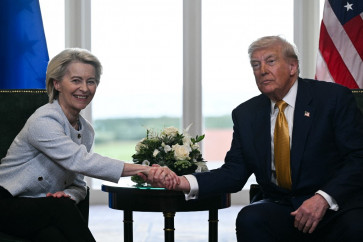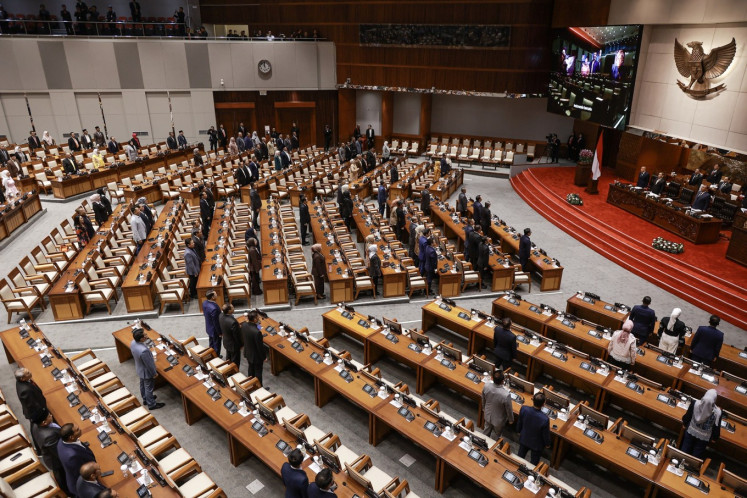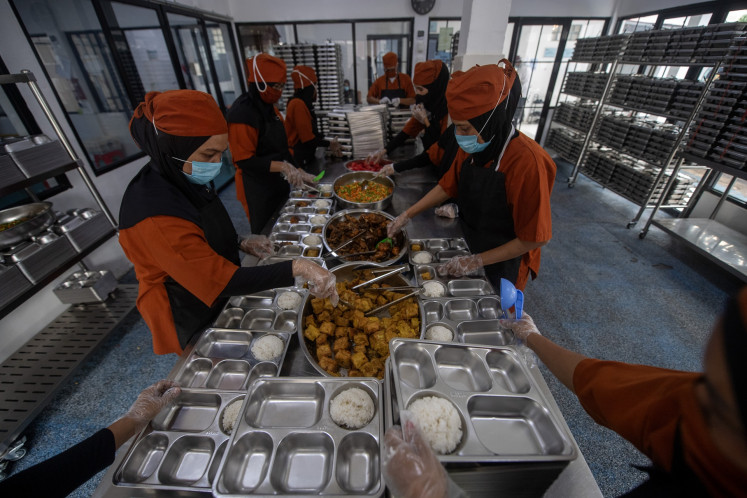Popular Reads
Top Results
Can't find what you're looking for?
View all search resultsPopular Reads
Top Results
Can't find what you're looking for?
View all search resultsScrambling between colliding interests, growth and prosperity
Full bloom: A colorful carriage-themed float makes its way down the Surabaya Vaganza 2019, an annual floral and cultural parade held by the Surabaya administration to commemorate the city’s 726th anniversary
Change text size
Gift Premium Articles
to Anyone
F
ull bloom: A colorful carriage-themed float makes its way down the Surabaya Vaganza 2019, an annual floral and cultural parade held by the Surabaya administration to commemorate the city’s 726th anniversary. The event is also part of the measures taken by the administration to showcase its achievements.(JP/Imanuddin Razak)
Surabaya, both a metropolitan and port city, plays a significant role in transporting goods and people to and from western and eastern parts of the country, as well as a growth center for its own inhabitants and surrounding regions. Surabaya Mayor Tri Rismaharini recently talked with The Jakarta Post’s Wahyoe Boediwardhana and Imanuddin Razak about her policies and strategy in leading and managing the city.
Entering the final year of her second and last term in office, Surabaya Mayor Tri Rismaharini looks more relaxed in viewing both criticism and praise of her leadership of the city. She remained focused on the procession of the Surabaya Vaganza 2019, the annual floral and cultural parade organized by the Surabaya administration, even though the event’s master of ceremonies (MC) Sudjadi — nicknamed Djadi of the Galajapo trio of local comedians — repeatedly made jokes about her body gestures and parlance in public.
Ibu Risma, as the mayor is popularly called, occasionally laughed at Djadi’s jokes, but her attention remained on the procession of the parade. She gave instructions to her subordinates in the field to help the parade participants to keep going forward and not prevent or halt the other participants behind from moving forward. Once in a while she spoke on her walkie-talkie to coordinate with her staff to ensure the parade went smoothly.
“It always takes a lot of energy to talk to the public about serious city matters. But, as you could see earlier, they have even been the subject of jokes by the MC,” Risma told The Jakarta Post later in the day during an interview.
As a public servant, Risma has won praise as well as criticism for her performance and service to Surabaya and its people. In October last year, she was awarded by the United Nations Human Settlements Program, or UN-Habitat, for her “people-centered and all inclusive” policies in the East Java city. Previously, she was elected president of United Cities and Local Governments Asia Pacific (UCLG-ASPAC) for the 2018-2020 period following an election held during the seventh UCLG-ASPAC congress in Surabaya, West Java, last September.
In 2015, the mayor was named one of the world’s 50 greatest leaders by United States business magazine Fortune. Ranked 24th on the list, she was above Facebook founder and CEO Mark Zuckerberg and Xiaomi’s CEO Lei Jun. Also in 2015, she won the prestigious Bung Hatta Anticorruption Award at home. Earlier in February 2014, she was named world mayor of the month by the London-based City Mayors Foundation, an international think tank dedicated to urban affairs.
Risma, who has a degree in architecture, rose to fame in 2005 as the head of the Surabaya park department, which is responsible for rejuvenating the city’s parks and developing more green spaces. She has been praised for her hands-on approach to the city’s problems, such as picking up trash along the roadside or getting out of her car and directing traffic.
Risma, who was first elected mayor in 2010, rose to popularity after her success in transforming Surabaya, a once neglected city, into a city with many first-class public parks. Known for her outspoken personality, Risma is also highly regarded for her success in closing down Dolly, one of the city’s notorious red light districts, in 2014.

The mayor is also known for her firmness in upholding transparency and fairness within the Surabaya City administration. She was the pioneer in the implementation of e-procurement and e-budgeting systems among the country’s regional administrations, a feat hailed for significantly reducing corruption within the Surabaya administration. One of her close aides even testified how she repeatedly rejected a key businessman’s request for privilege in a business tender in the city.
Her prominence reached its peak when she was reelected with a landslide victory in the December 2015 election along with her deputy Whisnu Sakti Buana, who won 86.22 percent of the vote, defeating Rasiyo-Lucy Kurniasari with 13.78 percent.
A sociologist of Malang-based Brawijaya University, Wayan Suyadnya, admitted that Risma had been successful in changing the face of Surabaya, by among other things beautifying the city and simplifying its public service system for the better. According to Wayan, who once resided in Surabaya and now shuttles between Surabaya and Malang, the award presented by Fortune for Risma as one of the world’s top 50 influential leaders was an apparent appreciation of her role in Surabaya’s development.
However, he named a number of problems in the city that needed serious attention, such as the enduring poverty and unequal provision of health and public service.
“The city’s public services are still lacking. And in my opinion, Bu Risma has been doing some political communication strategies and overreacted on some occasions although I have to admit that she is such a diligent person in taking care of the city,” Wayan told the Post in a separate interview.
He cited how she expressed her anger publicly upon finding out that flowers and plants in Bungkul Park had been trampled on at an event, although she later became involved in the restoration of the park.
Wayan described Risma’s leadership style as authoritarian, with her policies being categorized as top-down. He recalled when Risma yelled at a member of her staff in public for his failure to comply with her instructions.
Wayan also criticized Risma for neglecting the livelihood of poor people in the city, and favoring middle class society through her city development program.
“She only focused on the aesthetic development of the city, but did not think about whether these poor evicted people could eat or not for the rest of the day. That’s why Surabaya now looks so clean and tidy because of Risma’s assertiveness,” he said.
On Risma’s success in closing down Dolly, Wayan said it had indeed cleared Surabaya from prostitution, but created problems for the surrounding regions.
“According to a researcher friend of mind, those prostitutes are now scattered across regions like Malang, Gresik, Sidoarjo, Mojokerto, and even Singaraja in Buleleng, Bali,” he said.
“However, despite all my criticism, I still see what she has been doing is much better than any previous mayors of Surabaya,” added Wayan.
A resident of Jagir Wonokromo, Anggraeny Prajayanti, considered that Risma had performed quite well in leading and managing Surabaya. However, she noticed shortfalls in her leadership, particularly on public transportation.
“In my opinion, Bu Risma has not been successful in solving traffic congestion in Surabaya. It’s because Surabaya as the country’s second-largest metropolitan city does not have a mass public transportation service, like the MRT in Jakarta. Her plan to revive the tram service in Surabaya is still just a promise,” Anggraeny, who works as a freelance writer for a magazine, said.
Another resident, Suwandari, said she was satisfied with Risma’s leadership in Surabaya. The resident of Asem Jajar in Tembok Dukuh subdistrict, Bubutan District, was grateful that her children were able to go to school for free because of the free education policy of the Surabaya administration.
“Two children of mine go to a private school. However, they do not have to pay for the school fees because of the financial assistance provided by the Surabaya administration for the school’s operation. It’s really helpful for me and my children. Previous mayors of the city have never done such a thing before,” said the mother of three.
Education for the children of Surabaya is apparently the focus of Risma in developing Surabaya through her human development policy commitment.
“I just feel that I am successful in developing Surabaya only if I can see the young generation of Surabaya succeed in any international forums. That’s my success criteria in leading Surabaya,” Risma said.










